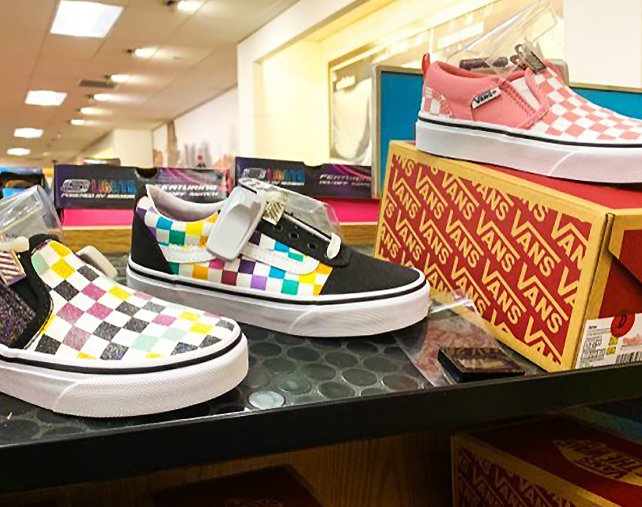Up against last year’s stimulus-fueled comps, footwear industry unit sales and revenue declined in the first quarter of 2022 versus the previous year, according to The NPD Group, as reported by SGB Media. U.S. footwear sales revenue fell by 3 percent, and unit sales declined by 12 percent as average prices increased by 11 percent.
Compared to Q1 2019, revenue for the quarter was 3 percent higher, and unit sales were 10 percent lower.
In addition to the missing additional income from stimulus money, inflation could be driving softness in the footwear industry in 2022, according to NPD.
However, NPD also noted that sales for some of the top footwear brands have softened versus last year and are underperforming compared to the rest of the market. NPD wrote in its analysis, “There is a lot of movement taking place in the footwear industry, particularly in the athletic space, as up-and-coming brands and new styles and technologies join the market. We could be seeing the beginnings of a seismic shift in the industry.”
Footwear Sales By Category
Revenue from women’s footwear in Q1 increased by 4 percent, men’s declined 6 percent, and kids fell 12 percent. The average selling price (ASP) for women’s footwear increased more than other categories, which fueled the revenue increase. The women’s market also benefited from improved fashion footwear sales, while men’s and kid’s markets relied on sport leisure footwear, which experienced softer sales.
Overall, sport leisure is the largest footwear category in the industry. Revenue declined in the mid-teens in Q1, with units down in the high-teens and ASP higher by mid-single-digits. Within the category, retro-style footwear revenue fell due to weakness from Nike, Jordan and Adidas. Sport slides were down 20 percent and skate shoe revenue declined by low-single-digits.
Nike’s sport leisure sales declined by about 25 percent, while Jordan and Adidas dropped in the mid-teens. New Balance grew by about 25 percent, while Puma, Skechers, Converse, and Vans declined in the category.
Sales revenue from fashion footwear, including dress, casual and slippers, grew 11 percent as unit sales fell by 11 percent. The only fashion segment to post unit sales growth was slippers, with sales rising across all wearers. Dress shoes accounted for over two-thirds of the fashion category’s growth, but the segment remained soft compared to 2019.
Within the fashion category, as noted above, revenue from private label brands collectively declined. Sales of Crocs grew 9 percent, and Steve Madden grew 57 percent due to rising sales for sandals. Skechers’ sales in the fashion category declined 14 percent. Clarks, Birkenstock and UGG each declined in the mid-single-digits.
Performance footwear outperformed the overall footwear market in Q1. While revenue was up slightly, the average price also declined slightly, a major slowdown from the 2021 rate. Unit sales increased in the low single-digits.
Running shoes captured the largest portion of performance footwear sales and experienced a slight revenue decline compared to Q1 2021. Walking, soccer/football and training shoes showed solid growth for the quarter. Basketball continued to decline, with weakness from Nike, the market share leader.
Nike performance footwear declined about 25 percent, with weakness in virtually every category. Adidas performance sales gained in the mid-teens. Skechers improved by more than one-third. Brooks slightly declined, while Under Armour grew in the high-single-digits. New Balance declined about 20 percent, and Asics fell by mid-single-digits. Hoka, On, Puma, and Saucony all grew in performance footwear for the quarter.
Outdoor footwear revenue declined by mid-single-digits, and unit sales declined by high-single-digits, while ASP grew by mid-single-digits. Revenue from hiking, trekking and mountaineering shoes declined by low-single-digits, while boots, including hunting and fishing boots, dropped by mid-single-digits.
UGG outdoor footwear revenue declined by mid-single-digits, while Columbia was down slightly, and Merrell declined by mid-teen-digits. However, Timberland, Keen, Skechers, and private label brands experienced growth in outdoor footwear.
Work, occupational and safety footwear revenue grew by 10 percent. Sneaker silhouettes accounted for almost 90 percent of the growth, followed by shoes. Boots declined in the low-single-digits but remained up in the teens versus 2019. Private-label sales collectively grew in the mid-single-digits, and Skechers and Wolverine increased slightly. Reebok sales more than doubled, and Timberland Pro grew in the low-teens.
NPD wrote, “Q2 will usher in a return to more pre-pandemic behaviors, such as more in-person work, travel and attendance at events and gatherings. These activities will help fuel continued improvement in sales on the fashion side, while interest in fitness and the outdoors will help drive the athletic business. However, macro pressures on the consumer, combined with tough comparisons from 2021, will likely curb growth.”


